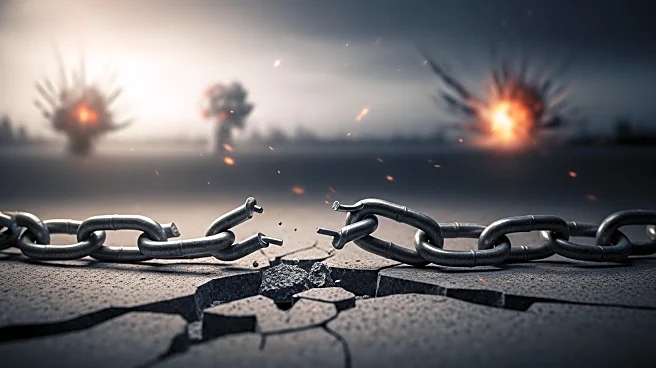What is the story about?
What's Happening?
Hamas has announced that it lost contact with two hostages during intense military operations and bombardments by the Israel Defense Forces (IDF) in Gaza City. The terrorist group claims that the hostages' lives are in significant danger due to the ongoing airstrikes in the Shabura and Tal al-Hawa neighborhoods. Hamas has demanded a 24-hour cessation of airstrikes starting at 6 p.m. to facilitate a rescue attempt. The Hostages and Missing Families Forum has stated that families of the hostages are in communication with relevant authorities to assess the situation. Israel's security forces estimate that several hostages are still alive in Gaza City, while Hamas asserts that approximately ten hostages remain alive.
Why It's Important?
The situation underscores the ongoing humanitarian crisis and the complexities of military operations in conflict zones. The loss of contact with hostages highlights the precarious conditions faced by civilians caught in the crossfire. This development could influence international diplomatic efforts and pressure on Israel to modify its military strategy. The demand for a halt in airstrikes may affect military tactics and negotiations between Israel and Hamas. The safety of hostages remains a critical concern, potentially impacting public opinion and international relations, especially with countries involved in mediating peace efforts.
What's Next?
The immediate next steps involve potential negotiations between Israel and Hamas regarding the cessation of airstrikes and the rescue of hostages. The international community may increase diplomatic pressure on both parties to prioritize civilian safety and hostages' release. Israel's military strategy might be reassessed in light of these developments, potentially leading to changes in operational tactics. Families of hostages and advocacy groups are likely to continue pressing for action and transparency from both sides.
Beyond the Headlines
The situation raises ethical questions about the conduct of military operations in densely populated areas and the protection of civilian lives. It also highlights the challenges of hostage negotiations in conflict zones, where political and military objectives often clash with humanitarian concerns. The ongoing conflict may lead to long-term shifts in regional alliances and influence peace negotiations, affecting the broader geopolitical landscape.
















